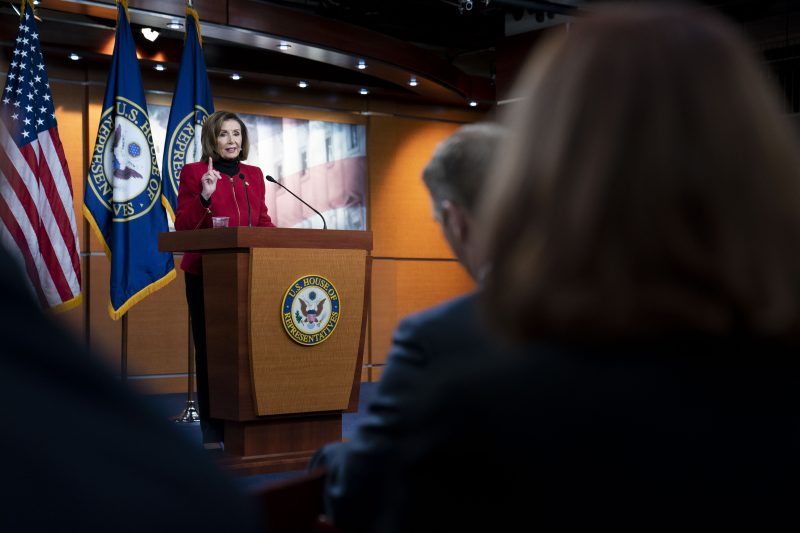On Nov. 19, 2002, the Senate confirmed a federal judge, passed a resolution funding the government, and created the Department of Homeland Security. After that, the chamber doors closed — nine days before Thanksgiving — and the Senate did not come back into session until the new Congress was sworn in seven weeks later.
It’s how things are supposed to work on Capitol Hill. But it’s exactly the way things no longer work.
Instead, this coming week, lawmakers are expected to be in town until Friday to approve the final bills for the 117th Congress. They may even work part of the last week of the year if some important business is on the verge of being negotiated.
Although this has been a productive two years overall for major legislation, congressional leaders have again waited until deep into the holiday season to assemble must-pass bills — and they’ve used them as legislative Christmas trees, attaching unrelated measures small and large.
These recent lame-duck sessions, after voters have chosen lawmakers for the next Congress, have turned into quite momentous periods.
The Senate signed off on the annual Pentagon policy bill late Thursday night. And leaders hope soon to unveil the details of a $1.7 trillion outline for funding federal agencies, with final votes planned by Friday, just two days before Christmas.
Passing these two behemoth bills is not cause for celebration; it’s a perfunctory duty. The Pentagon legislation has passed every year for more than six decades, and the funding bill must be approved or else the government shuts down.
Asked Thursday by Chad Pergram of Fox News why Congress waits so long to complete its basic tasks, House Speaker Nancy Pelosi (D-Calif.) grew irritated.
“We’ve been here longer. We have been here longer,” Pelosi said at her weekly news conference, relating how she took lawmakers on a New Year’s Eve 2012 trip to the National Archives because Congress was still handling tax legislation.
“It is not a tactic. We would have liked to have done it much sooner,” she added, before admitting, “There’s a better way to do it, yes.”
But these delays sure have a strategic impact amid the overall atrophying of Congress’s ability to pass important legislation as stand-alone bills.
Twenty years ago, the House and Senate each passed competing versions of the Pentagon bill before July 4, then they went into prolonged negotiations and the final version passed Nov. 13, 2002. This year, the Senate didn’t bother to act until it hatched a final version of the bill Dec. 6 after behind-closed-door talks with House leaders.
Once the Senate gave its blessing late Thursday to the legislation, lawmakers started to brag about the unrelated items they had tacked on to the bipartisan Pentagon bill. Sen. Charles E. Grassley (R-Iowa) touted having gotten a bill to increase funding for states to work on sexual assault cases, providing a federal standing for the rights of survivors.
Republicans on the House Homeland Security Committee highlighted 10 provisions that are under their jurisdiction that they managed to tuck into the Pentagon bill. One instructed FEMA to provide better assistance to small states and rural towns during natural disasters.
These policy riders, a long tradition in Congress, have grown so prolific that sometimes the additional items are more important than the underlying bill serving as the legislative Christmas tree.
Take this year’s government funding bill.
By waiting so late, congressional leaders are presenting their rank-and-file lawmakers with a hostage situation: Vote yes, approve the $1.7 trillion for federal agencies, and you can leave the Capitol in time for flights home by Christmas Eve.
“We all understand Christmas is Sunday and none of us want to be here. But all of us have a responsibility to complete the business of funding the government of the United States. So we will be here,” House Majority Leader Steny H. Hoyer (D-Md.) told colleagues Thursday.
Leaders tried for a few weeks to make it sound as if the delays were caused by spending disagreements. Senate Minority Leader Mitch McConnell (R-Ky.) threatened to oppose the emerging legislation, called an “omnibus” by insiders, over objections to Democrats’ seeking an additional $26 billion of funding for domestic agencies.
That dispute added up to about 1.5 percent of the entire the bill, almost a rounding error, and the bipartisan leadership of the Senate Appropriations Committee announced Tuesday that it had a framework for the deal without revealing even what the overall spending would be.
In this case, the unrelated policy riders almost certainly will be more consequential than the underlying funding bill. Leaders have signaled that they will attach up to $37 billion to support Ukraine in the war against Russia.
In addition, they are certain to attach the Electoral Count Act, a response to the attack on the U.S. Capitol on Jan. 6, 2021, by supporters of then-President Donald Trump trying to overturn his election loss to Joe Biden in 2020.
As so often happens, the House passed its version of the bill in September. The Senate reached a bipartisan deal on its version of the legislation but then declined to act. Senate leaders just sat on the bill, deciding a few months ago that it would just be easier to attach this critically important bill to one of the must-pass buses just before Christmas.
Others are trying to attach riders that would reduce cuts to Medicare, create a legal banking framework for cannabis companies and renew a child tax credit.
Pergram’s questions to Pelosi were spot-on and well-informed. This isn’t the way things used to work.
In 1990, 1992, 1996 and 1998 there were no legislative sessions after the elections, according to Senate records. In 1998, the House convened during the lame duck solely to consider the impeachment of President Bill Clinton.
As recently as 2008 — when the entire domestic and international economy was cratering — the lame-duck session was, in fact, pretty lame.
The Senate cast just two votes after the 2008 election: The first, on Nov. 20, approve extended unemployment benefits as the Great Recession started, and the second, on Dec. 11, failed to create a bailout program for the auto industry.
The chamber then adjourned. The House had closed up the day before. Congress didn’t return to session for almost four weeks.
But in 2009, as Republicans used every possible tool to block them, Senate Democrats stayed in session until Christmas Eve to pass their version of the Affordable Care Act.
It was like a psychic breakthrough. Congressional leaders then knew they could consider legislation right up to the once sacrosanct Christmas holiday and beyond.
The last votes in 2010 came on Dec. 22, and two years later Congress rang in the new year inside the Capitol: The Senate passed the “fiscal cliff” legislation raising taxes on the rich after 1:30 a.m. on Jan. 1, 2013, and the House signed off later that night — about 36 hours before the new, 113th Congress was sworn in.
In 2018, GOP leaders waited till a few days before Christmas to try to pass the agency-funding bill, only to learn that Trump opposed the legislation over a dispute about money for the border. The government partially shut down three days before Christmas and did not reopen for five weeks.
Both chambers waited until Dec. 21, 2020, to pass the omnibus spending bill for federal agencies, which included a gargantuan rider of $900 billion of funding to deal with the health and economic crises spawned by the coronavirus pandemic.
Rank-and-file lawmakers were asked to vote a few hours after the more than 5,000-page bill had been publicly released.
This is why Congress needs time to actually read this package before voting on it.
Members of Congress have not read this bill. It’s over 5000 pages, arrived at 2pm today, and we are told to expect a vote on it in 2 hours.
This isn’t governance. It’s hostage-taking. https://t.co/JpBbEHHkVG
— Alexandria Ocasio-Cortez (@AOC) December 21, 2020
This Congress, with both chambers run by Democrats and with Biden in the White House, will go down as historically significant. In March 2021, Democrats passed the party-line, $1.9 trillion pandemic relief plan, followed by the August 2022 party-line budget plan that poured more than $300 billion into fighting climate change and reined in some medical costs.
In between, several major bipartisan plans got passed, including a $1 trillion infrastructure plan and a $280 billion plan to boost U.S. manufacturing.
Voters are recognizing the accomplishments. According to a Marist Poll for NPR and PBS, 24 percent said this Congress accomplished more than recent Congresses — the highest percentage saying that since 1998.
Despite those successes, however, Congress will end this session in the coming days with a flurry of last-minute votes in which lawmakers will complain about having little input into trillions of dollars of spending and critical policy riders.
The drawn-out process might not be an official tactic, but leaders on both sides of the aisle have accepted this lame-duck smorgasbord as the new normal.
“The fact is,” Pelosi said Thursday, “we’re on a good path now to get something done.”



























